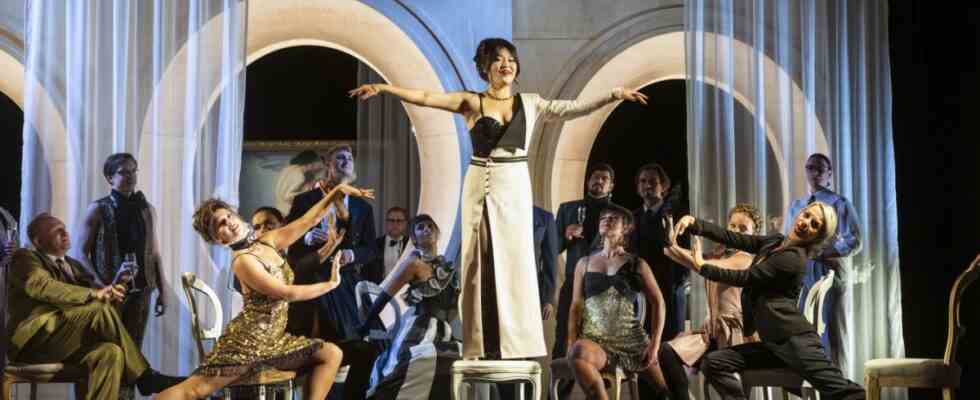Creating a lively production is a challenge in the Martini Park interim district of the Augsburg State Theater with its reduced stage technology. For Verdi’s “La traviata”, director Eva-Maria Melbye solves the problem with mobile wall segments from which large, round openings have been cut. These segments provide elegance in the ball scene with cool architecture, are showcases for the nightclub scenery for the finale of the second act, hospital rooms for Violetta. Whether they are loosely distributed or as a wall in the foreground of the stage and thus allow views through the openings, they always suggest a depth that the stage space actually does not have, and thus open up scope for the ensemble.
The choir and extras of the State Theater make excellent use of them. The crowd scenes are wonderfully animated, yet never overexcited; the choir sings in a finely balanced manner. The musical quality is formative for this premiere. There is no orchestra pit in Martini Park. You have the best view of the orchestra positioned in front of the stage. One can observe the love for details with which General Music Director Domonkos Héja conducts the perfectly prepared Augsburg Philharmonic, integrating small, quite concise effects without, however, inhibiting the flow of the music, which is well-proportioned in the tempi.
General music director Domonkos Héja and the grandiose Violetta singer Jihyun Cecilia Lee are the central couple of this performance
It is only logical that he and the grandiose Violetta singer Jihyun Cecilia Lee received such great applause at the end; in a way they are the central couple of this performance. The impetus with which Lee interprets her role, vocally triumphing when Violetta dominates Parisian nightlife as a seductive vamp, desperate when Giorgio Germont tries to talk her out of love for his son Alfredo, is captivating. It is also convincing that the confrontation between Germont (Alejandro Marco-Buhrmester, who starts off harshly but also has a warm voice) and the unwanted daughter-in-law in this production is a real confrontation – at least as far as this is concerned within the framework of an increasingly homogeneous composition over the course of the piece duet is possible.
The main male role, of course, is that of Alfredo. Before the start, one is attuned to the fact that tenor Jacques le Roux is going into the game with poor health. There are then two facets of vocal skill to experience: on the one hand, those passages, especially after the break, in which Roux’s disposition seems almost unrestricted, his very full tenor carries and goes hand in hand with a gripping stage presence. On the other hand, there are the moments when the cold takes its toll. How Roux avoids the loud or the falsetto here or octaves in order to keep the voice in place, sometimes so skilfully that it could be intentional in terms of interpretation, one would not know how necessary it is – this honest musical practice is no less impressive.

